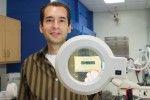Soon, forensic scientists may be able to take some of their DNA lab equipment to the scene of a crime in their pockets.
Victor Ugaz, an assistant professor of chemical engineering, has developed a virtually pocket-sized tool to allow forensic scientists, who are dealing with very small traces of DNA samples, to increase the samples’ concentration so that any DNA can be detected.
“You could take a sample and load it onto this chip,” Ugaz said. “(You can) have it do all these reactions in a handheld device.”
The device is a small component of a machine and is made of electrodes about 50 microns wide that attract the negatively charged DNA down a channel. A micron, Ugaz said, is one millionth of a meter wide; a human hair is 50 to 100 microns wide.
The DNA becomes more and more concentrated as it moves along the channel, he said.
The device’s on-site detection abilities would help eliminate the problem of losing samples en route to labs where the DNA analyses can be run.
“The fresher the sample, the better,” said Jim Olson, a professor of entomology who instructs a class on forensic entomology.
Olson is working on a few forensic cases and said the mobility this chip allows will help detect DNA from samples that are usually difficult to detect, such as samples that are liquefied in small amounts or ones that have small traces of DNA.
“I can see it being used by crime scene investigators … we deal constantly (with) minute amounts of DNA … in corpses at death scenes,” Olson said.
This technology could be useful in detecting avian flu in groups of birds, said Geoffrey Kapler, assistant professor of molecular and cellular medicines. “If you had an animal that was infected with (the) avian flu virus and you wanted to screen healthy animals and identify the infected animals, the more sensitive your test, the more you can detect virally infected birds,” he said.
Ugaz’s technology, which he started thinking of as a graduate student at the University of Michigan, requires the DNA to already be extracted, but he hopes to develop a way to extract it in the future.
New chips on the block
April 25, 2006

0
Donate to The Battalion
Your donation will support the student journalists of Texas A&M University - College Station. Your contribution will allow us to purchase equipment and cover our annual website hosting costs.
More to Discover








